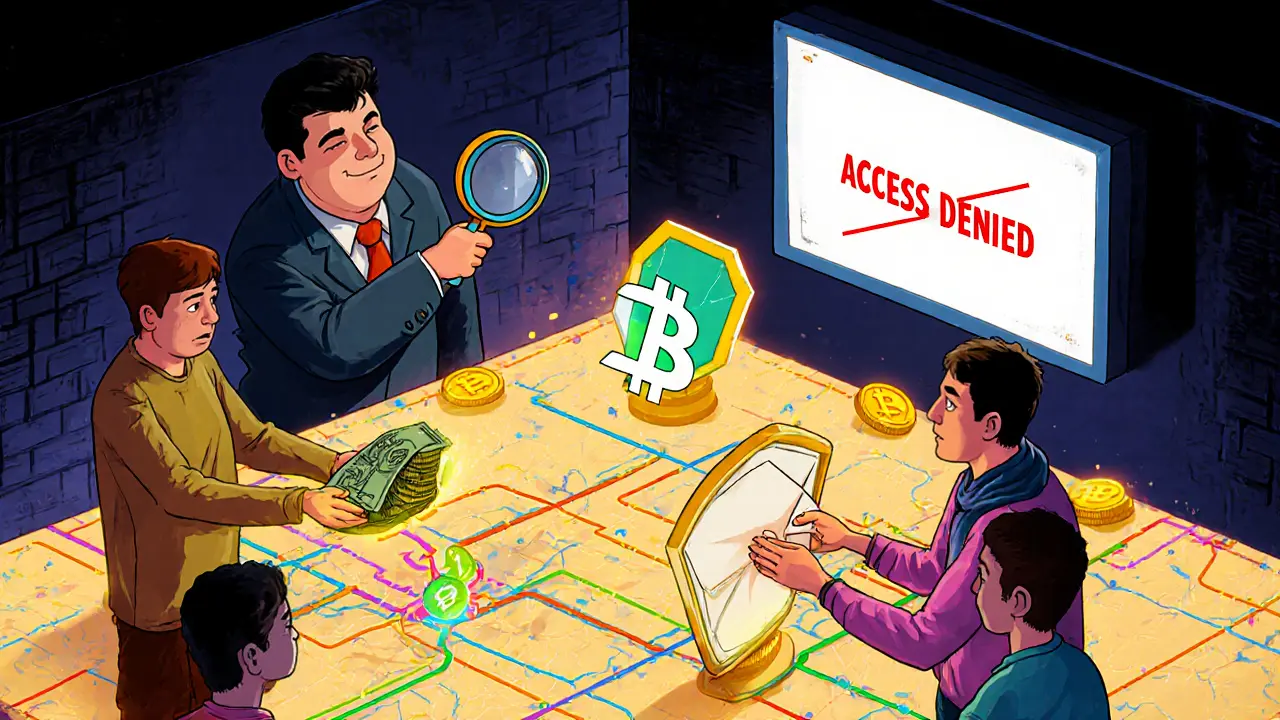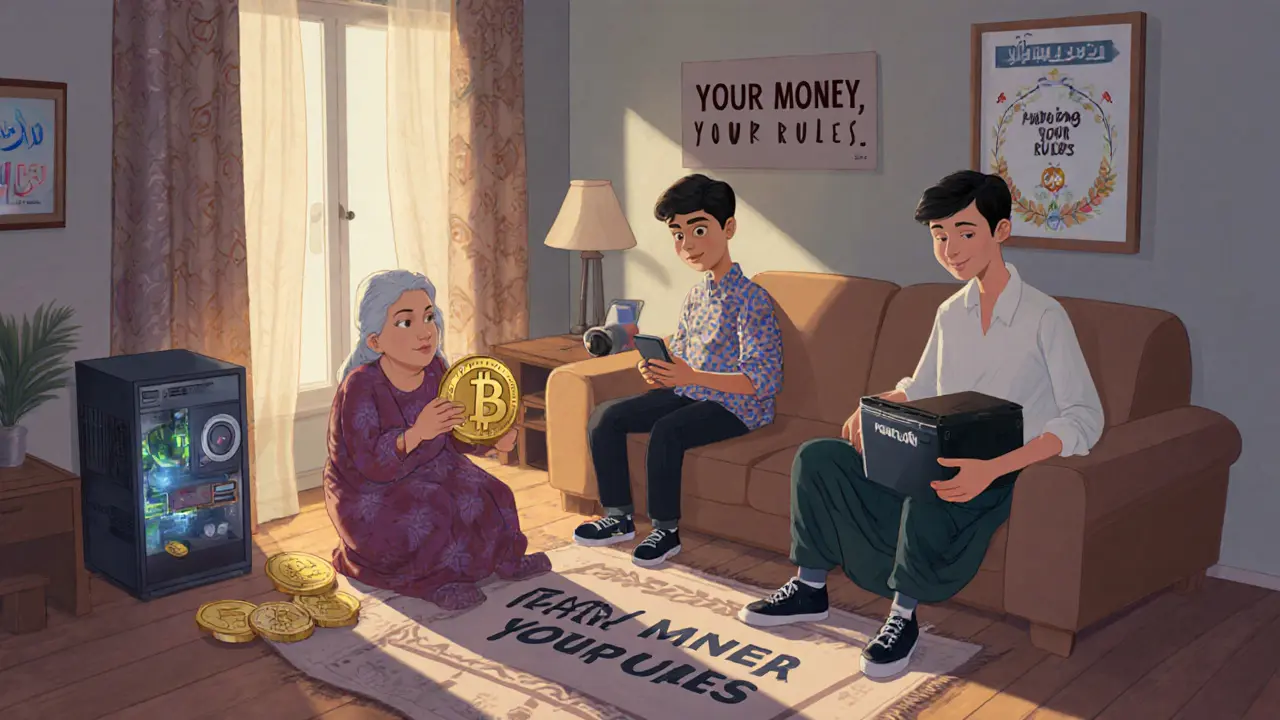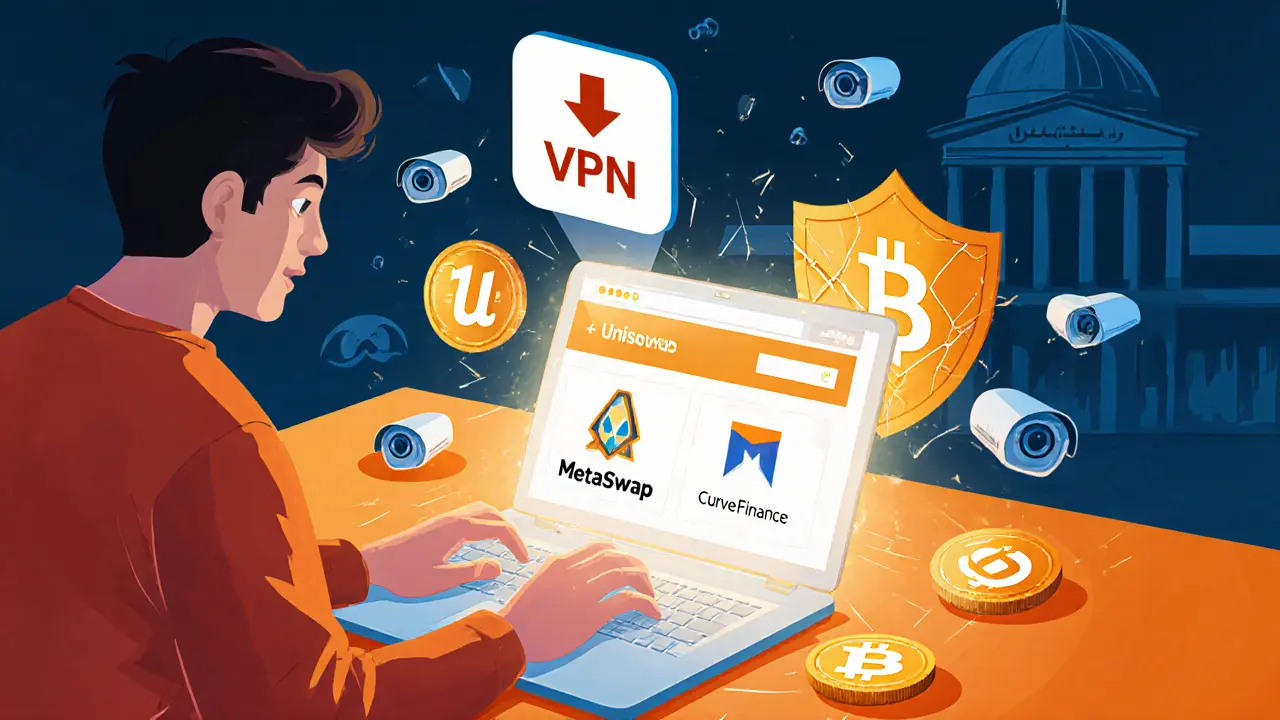DEX Transaction Cost Comparison
Why This Matters for Iranian Users
The cost of transactions on Ethereum mainnet can be prohibitively expensive for Iranian users. Polygon offers significantly lower fees, making it the preferred network for DEX trading in Iran.
Ethereum Mainnet
Polygon
Why Polygon is the Better Choice for Iranians
- ✅ 40x cheaper than Ethereum
- ✅ Transactions complete in 2-3 minutes
- ✅ Less likely to be blocked by sanctions
- ✅ No need for complex gas fee management
Important Considerations
While Polygon is cheaper, always remember:
- Use a reliable VPN when accessing DEXs
- Never link your real identity to your wallet
- Keep small amounts for daily trading
- Never share your seed phrase
This tool provides estimated transaction costs. Actual fees may vary based on network congestion and specific DEX usage.
For many Iranians, accessing global financial systems isn’t just difficult-it’s nearly impossible. Banking restrictions, sanctions, and inflation have pushed people to look for alternatives. Cryptocurrency became one of them. But while centralized exchanges like Nobitex once offered a lifeline, recent crackdowns have made even those risky. That’s why more Iranians are turning to decentralized exchanges-platforms that don’t require permission, don’t hold your money, and can’t be shut down by a single government order.
Why Centralized Exchanges Are No Longer Safe
Nobitex used to be the go-to for Iranian crypto users. With over 11 million accounts, it handled more than 87% of all local crypto trades. But in June 2025, it got hacked. Over $90 million vanished. And that wasn’t even the worst part. In July 2025, Tether froze 42 Iranian-linked wallets. More than half of them were tied to Nobitex. Some of those wallets had direct connections to addresses flagged by Israeli counter-terror finance units as linked to the IRGC. Suddenly, holding USDT-once considered the safest stablecoin-became dangerous. Your money could disappear overnight, with no warning, no appeal, and no recourse. The Central Bank of Iran (CBI) didn’t wait to react. In January 2025, it declared itself the sole regulator of all cryptocurrency activity. Every Iranian user, business, or miner must now get a license. The CBI gets full access to every transaction, wallet, and identity linked to crypto. That means if you trade on a centralized platform, they know exactly what you did, when, and how much. And if they decide you’re a risk? Your account gets locked. Your funds get seized. No court order needed.What Makes Decentralized Exchanges Different
A decentralized exchange (DEX) doesn’t work like Nobitex. There’s no central server. No customer support team. No one holding your keys. You connect your wallet-like MetaMask or Rabby-directly to the DEX, and you trade peer-to-peer using smart contracts. No middleman. No paperwork. No license required. That’s why DEXs are becoming the only viable option for Iranians who still want to trade crypto without risking everything. Even if the government blocks the website, you can still access it through a VPN. Even if they track your IP, they can’t freeze your wallet unless they have your private key-and they don’t. The real advantage? DEXs run on public blockchains. If you’re on Ethereum, Polygon, or Arbitrum, your transactions are visible to everyone-but controlled only by you. The CBI can’t shut down Polygon. They can’t force Uniswap to freeze your account. They can’t demand your transaction history from a smart contract.Which DEXs Are Actually Working in Iran Right Now
Not all DEXs are created equal. Some are slow. Some are expensive. Some get blocked easily. Here’s what’s actually working for Iranians in late 2025:- Uniswap (on Polygon) - The most popular choice. Low fees, fast swaps, and Polygon’s network is harder to block than Ethereum. Many Iranians now swap USDT for DAI here.
- Curve Finance (Polygon) - Best for stablecoin swaps. If you need to turn USDT into DAI or USDC without losing value, Curve is the most efficient.
- 1inch - A meta-aggregator. It searches multiple DEXs at once to find the best rate. Useful if one DEX is slow or has low liquidity.
- OpenSea (for NFTs) - Not a DEX, but many Iranians use it to convert crypto into NFTs, then resell them on other platforms to move value out of Iran.

How to Set Up a DEX Wallet in Iran
You don’t need to be a tech expert. Here’s the simplest way to get started:- Download a wallet app: MetaMask (mobile or browser extension) or Rabby (faster, better for Iran).
- Connect your wallet to a VPN. Use a reliable one like NordVPN, ExpressVPN, or ProtonVPN. Avoid free ones-they often leak data.
- Buy a small amount of ETH or MATIC (Polygon’s token) from a peer-to-peer platform like LocalCryptos or Paxful. Use cash or mobile payment if possible.
- Go to Uniswap or Curve on Polygon. Connect your wallet.
- Swap your ETH or MATIC for DAI. Keep a small amount of MATIC for future fees.
Why DAI Is the New USDT for Iranians
USDT was the default. Now it’s the riskiest option. Tether’s ability to freeze Iranian wallets showed that even “stable” coins are controlled by centralized companies. DAI is different. It’s created and managed by MakerDAO-a decentralized organization with no CEO, no headquarters, and no ability to shut down your wallet. In August 2025, Iranian crypto influencers and even government-aligned channels started pushing DAI on Polygon. Why? Because it works. It’s liquid. It’s stable. And it’s immune to Tether-style freezes. Many Iranians now use DAI as their main holding. They swap it for other tokens on DEXs. They send it to friends abroad. They use it to pay for services on decentralized platforms. It’s become the unofficial currency of Iran’s crypto underground.
The Risks Are Still Real
Using a DEX doesn’t make you invisible. The CBI still tracks everything. If you use a domestic internet connection without a VPN, they can see your traffic. If you buy crypto with a local bank account, they’ll trace it. If you trade large amounts, you could be flagged for tax violations. In August 2025, Iran passed a new law: capital gains tax on crypto. For the first time, trading Bitcoin, Ethereum, or DAI is taxable. The government is watching. They’re auditing. They’re cracking down on unlicensed miners and traders. And don’t forget: Iran still bans foreign-mined crypto for domestic use. That means if you’re mining Bitcoin on your home PC, you’re breaking the law-even if you’re not selling it. The key is discretion. Don’t brag. Don’t post screenshots. Don’t use your real name. Use a VPN. Use a burner wallet. Keep small amounts. And never, ever share your seed phrase.What Comes Next?
The Iranian government isn’t backing down. They’re building their own blockchain systems. They’re trying to create a state-controlled crypto economy. But they can’t control the open internet. They can’t control Ethereum. They can’t control smart contracts. Meanwhile, Iranians keep adapting. They’re using DEXs. They’re swapping into DAI. They’re moving value through NFTs and peer-to-peer networks. They’re bypassing sanctions not with grand schemes, but with quiet, daily choices. The future of crypto in Iran won’t be decided by laws or regulations. It’ll be decided by how many people still believe they have the right to control their own money.Can I use DEXs in Iran without a VPN?
Technically, yes-but it’s risky. Without a VPN, your internet provider and the Central Bank of Iran can see that you’re accessing crypto websites. They may block the site, flag your account, or even investigate you. Using a reliable VPN is the safest way to hide your activity from local surveillance.
Is DAI really safer than USDT in Iran?
Yes. USDT is issued by Tether, a company that has frozen Iranian wallets in the past. DAI is created by MakerDAO, a decentralized system with no single owner. No one can freeze your DAI unless they steal your private key. That’s why Iranian users have shifted to DAI on Polygon after the July 2025 Tether freezes.
Do I need to pay taxes on DEX trades in Iran?
Yes. Since August 2025, Iran has imposed capital gains tax on cryptocurrency trading, including DEX swaps. Profits from trading DAI, ETH, or any crypto are treated like gains from gold or forex. While enforcement is still patchy, the law is active. Keeping records of your trades is now legally advisable.
Can I use Nobitex safely anymore?
No. Nobitex was hacked for over $90 million in June 2025, and its wallets were frozen by Tether in July 2025. The Central Bank of Iran now has full access to all Nobitex data. Using it means giving the government complete visibility into your crypto activity. Most Iranians have moved away from it.
What if my wallet gets flagged by the CBI?
If you’re using a DEX with a VPN and your own wallet, the CBI can’t freeze your funds. But they might investigate you if you’re using local payment methods or large transfers. The best protection is to keep small amounts, avoid linking your real identity, and never reuse wallets across platforms.

Derajanique Mckinney
October 29, 2025 AT 11:03Frech Patz
October 31, 2025 AT 06:36The structural shift from centralized to decentralized infrastructure in Iran represents a profound reconfiguration of financial sovereignty under duress. The Tether freeze event was not merely a technical incident but a geopolitical signal that stablecoins are not immune to state-aligned financial coercion. DAI, as an algorithmic stablecoin governed by on-chain collateralization and decentralized governance via MakerDAO, introduces a novel vector of resistance. Its lack of a centralized issuer renders it functionally unseizable under current regulatory paradigms. The adoption of Polygon as a settlement layer further mitigates exposure to Ethereum-based sanctions, leveraging its lower transaction costs and reduced surveillance surface. This is not merely a workaround-it is the emergence of a parallel financial architecture.
That said, the claim that DEXs render users invisible is misleading. While wallets are pseudonymous, on-chain analysis can still link activity patterns, especially when fiat on-ramps are traced through local payment systems. The CBI’s capital gains tax enforcement, though currently patchy, signals intent to monetize and control this underground economy. True autonomy requires not just technical literacy but operational security: burner wallets, air-gapped key storage, and avoidance of any identity linkage.
Rosanna Gulisano
October 31, 2025 AT 08:21Sheetal Tolambe
November 1, 2025 AT 21:57This is actually so inspiring to see how people are finding ways to stay financially independent despite everything. I’ve been following crypto in India and we have our own challenges with regulations, but seeing Iranians build this quiet resistance gives me hope. Using DAI on Polygon feels like holding a piece of the open internet in your pocket. It’s not just about money-it’s about dignity. I hope more people learn about this and stay safe. Keep sharing tips like this, it’s helping so many.
gurmukh bhambra
November 2, 2025 AT 13:16Wait wait wait… you think this is just about crypto? Nah. This is a CIA psyop. They let Tether freeze those wallets on purpose so people would panic and run to DAI. Why? Because DAI is backed by Ethereum and Ethereum is controlled by Vitalik Buterin who works with the US intel. They want Iranians to move to DAI so they can track everyone through smart contract analytics. And don’t get me started on Polygon-MATIC is just a Trojan horse. The CBI isn’t the enemy, the blockchain is. They’re using this to build a global crypto surveillance grid. You think you’re free? You’re just another node in their network.
Also I heard from a guy in Tehran who knows a guy who works at the Ministry of Communications that they’re planting fake DEX websites with backdoors. Don’t use Uniswap. Use a private mirror. And never connect your wallet without a Tor bridge and a hardware wallet you bought in Dubai. I’m not paranoid-I’m prepared.
Sunny Kashyap
November 4, 2025 AT 03:43james mason
November 4, 2025 AT 17:51How quaint. You’ve all just rediscovered the basic premise of Bitcoin: censorship resistance. But let’s be honest-this isn’t financial liberation. It’s the desperate scramble of a population trapped in economic collapse, clinging to a technological band-aid while their currency implodes. The fact that you’re all using Polygon instead of Ethereum because it’s ‘cheaper’ speaks volumes. You’re not building a new financial system-you’re optimizing for survival on a sinking ship. And DAI? Please. It’s still tethered to the same fiat system, just with more code and less transparency. Real financial sovereignty means leaving the entire paradigm behind, not just swapping one centralized risk for another disguised as decentralization.
Also, if you’re using MetaMask on a mobile device? You’re already compromised. No VPN, no hardware wallet, no anonymity. Just a glorified web wallet with a false sense of security. You’re not hackers-you’re hobbyists with a debit card attached to a blockchain.
Anna Mitchell
November 5, 2025 AT 15:13I just wanted to say thank you for writing this. I’ve been reading about crypto in Iran for months and it’s easy to feel helpless, but this gives me real hope. People are figuring this out with so little and still managing to keep their money safe. I wish more people knew how powerful this is-not just for Iran, but for anyone living under financial control. Keep sharing the tips, keep staying safe, and keep believing you deserve to control your own money. You’re not alone.
jummy santh
November 5, 2025 AT 17:22As a Nigerian who has navigated similar financial constraints under currency controls and banking restrictions, I can deeply relate. The shift from centralized platforms to DEXs mirrors what many of us in Africa have done with Paxful, LocalBitcoins, and now DeFi protocols like PancakeSwap. The principle remains the same: sovereignty through self-custody. DAI on Polygon is indeed a brilliant adaptation-low cost, censorship-resistant, and globally accessible. I encourage all users to also explore stablecoins like naira-backed tokens on Binance Smart Chain as a bridge for cross-border remittances. However, I must echo the caution about operational security: never reuse wallets, always verify contract addresses, and use a trusted hardware wallet if possible. Your financial freedom is worth the extra steps. The world is watching, and your quiet resilience is a model for others facing similar oppression.